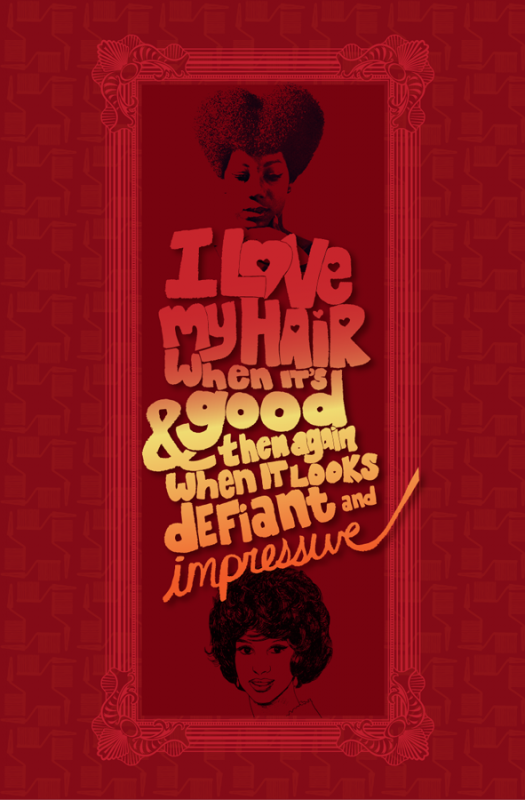Expansive Love
Durham, Me & the Other
I remember Saturday mornings in my grandma’s kitchen in Durham, sitting between her legs, limbs akimbo, getting my hair done while Don Cornelius made his Saturday morning appearance on her tiny, little, rabbit-ear-topped television. I remember being sent next door to Mrs. Pratt’s house to borrow sugar and lingering long because she always had the most elaborate artificial floral bouquets to marvel over. And oh the days of getting a running start before gliding head-first down the Slip-n-Slide in grandma’s backyard, with my cousins on the sidelines cheering me on like I was competing in an Olympic event.
I have such delightful memories of home, family, and community in Durham. And yet, as I delight in the complete and total success of my first-ever professional theatrical creation premiering here in my hometown, I can only seem to muse about Paris and Brooklyn, DC and Addis Ababa, and other places that I’ve never visited, places that resemble nothing of home. And yet, it was home that shaped my success.
I allowed myself, through a creative process, to make inquiries about what home meant for me, to investigate why home was seemingly so important to my current condition. Then I stopped apologizing for needing it.
It wasn’t long ago that I was calling Boulder, Colorado, home. In some odd twist of fate, I ended up in one of the whitest cities in America, and arguably one of the whitest academic institutions. I wish I could say that I was exaggerating, but really, I don’t think I am. So there I was, at Naropa University working on my MFA in Theater and Contemplative Performance, exploring contemplative approaches to making art. Now you must understand how deliciously diverse Durham is to appreciate how jolting the homogeneity of Boulder felt. I remember sitting on the cushion like a good student, during Meditation Practicum, trying to return to my breath when I’d notice my mind doing what minds do, sprawling out across the blonde hardwood floors, feeling the underneath surface during Developmental Movement, or fully giving myself to emotional shifts, like a mad person, during Psycho-physical acting classes. In all this mindfulness and contemplation, I noticed the irony of it all, that in my effort to find “my art”—what was authentic about my contribution to society as an artist—that I was actually living it, right there in Boulder’s 1% African American slice of the pie.
So, I slid right into what was present, what was there for me, what I was feeling (isolated) and what I needed (support, Durham). I allowed myself, through a creative process, to make inquiries about what home meant for me, to investigate why home was seemingly so important to my current condition. Then I stopped apologizing for needing it. I called home for Thanksgiving and asked that my generous mother and grandmothers gather my favorite dishes, put them on dry ice and send them to me. I remembered all the women who had been important in my early development as a community-baby, the product of teenage parents, and found other African American women in the Boulder-Denver area who reminded me of that sister-mama-auntie-love, and made cause for us to come together. I asked women in my life whom I loved and respected to send me notes of wisdom for my 30th birthday. I began to reassemble home for myself, filling the 2600-mile gap that had been created in my quest for personal and professional development.
In the act of filling that gap was the origin of my first play, I Love My Hair When it’s Good: & Then Again When it Looks Defiant and Impressive. While in Boulder, I spent nearly three years allowing myself to delight in the memories and sensations of home, and I asked other women like me to do the same. I interviewed Black American women and women from the African Diaspora about hair and home and identity, searching for ways to acknowledge and affirm our experiences in a way that we could be proud of.

But once I graduated from Naropa, and returned to Durham, I found it easier to construct the script in my hometown. I was actually surrounded by the women I was writing about, seeing the kinds of places they were moving through, feeling the sensations I was hoping to evoke. It was a lovely experience that came with ease. And then there were the actors and designers who I remembered, those I had worked with before and those that I wanted to work with. It was easy. It was easy in the sense that I had an established community of artists that added a sense of liberation and safety to my creative process. I knew I wasn’t alone; home was a safety net. And when my production budget came up short I knew that I had 34 years worth of support to call on. It was moving. People were showing their support even before seeing a stitch of my work. So I suppose I shouldn’t have been so speechless when every show at Manbites Dog Theater was sold out, with waiting lists. I Love My Hair was an overwhelming success.
And here I am just two months after its premiere thinking of all the places I’d rather be, all the places in the world I’d rather be making work, all the corners of the globe I’d rather be calling home. I am grateful, but I am also exhausted and feeling insecure about my ability to deliver another piece of work to my community, another piece in which they can invest as much as they did in I Love My Hair. But perhaps that’s not what I need. Making work in your hometown is a bittersweet experience. Durham is largely responsible for making me the artist that I am; I can’t deny that, in fact, I’m proud of it. But though it has served me well in this last round, it does not determine my identity. I’m hoping that Durham and me can find a way to explore a more expansive relationship. After all, I believe there is enough of us both to go around.



Comments
The article is just the start of the conversation—we want to know what you think about this subject, too! HowlRound is a space for knowledge-sharing, and we welcome spirited, thoughtful, and on-topic dialogue. Find our full comments policy here
So I found you again and maybe at the right time if you are contemplating some work in a very different place. We're already looking to next summer, but every once in a while a hole opens where terra firma was supposed to be so let me know your avaialbility over the next 12 months.
So great to hear from you Nan. I'm down to travel and now have the space and time to take in some new experiences. I'll inbox you to chat more about it all.
Durham will claim you and support you and your talent whether you are home, playing in the backyard, or a million miles away. More than community, Durham is FAMILY; your "creative kin". We got your back, and are proud of the meaningful work you do, no matter where in world it takes you. Bull City, baby...you represent it so, so well!
I love you Shana T!
I came to this piece through Carl Kenney's Facebook page. What I'm going to guess you'll find, as I've been, is that this is just the beginning of discovering your personal and artistic identity. I always thought I was a Northerner with English and French heritage ... took moving here to find Scots and Irish and Czech/German and Cherokee, some people I'm proud of and some I'm ashamed of and some I'm both proud and ashamed of all at the same time. None of us lives very far from the history of the whole world. So all those places you want to go: they belong to you, too, and you belong to them. Go forward to where you're called.
I love that Carlene. Thanks for sharing.
FANTASTIC PIECE!
Thanks Marshall!
Chaunesti, you are one of my reasons for loving Durham. I am moved by what you capture here about isolation, home, creative process, and the difficult transition from a first major project to the unknown next. Feeling it.
Thanks Collie... the feeling is mutual. :)
Thanks for this. I appreciate your willingness to be honest and your ability to clearly articulate your thoughts and feelings.
Thanks Jamil!